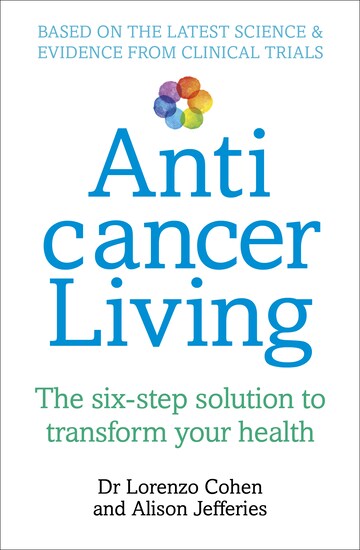
We might debate which of the six pillars should lead off because they are all key. Although to some it might seem an unusual choice, we have chosen to put social support in the top spot.
While diet and exercise are critical, of course — along with the other pillars — what Alison and I have found is that support is the backbone on which all other lifestyle changes will either succeed or fail, whether it is logistical (having someone take care of the kids while you attend a new yoga class), motivational (to help overcome entrenched eating habits), or psychological (to uncover deep emotional issues that keep you from being the person you want to be).
The people you enlist to support you are key to your success. Establishing an effective, personally tailored support network is where anticancer living begins, not where it ends. It is the root required for the tree to stand, the foundation upon which the house can be built, and the stability that will ground and balance you as you move forward.

This is not how we are taught to think about our lives. Western culture tends to emphasise individual accomplishments, a do‑it‑alone attitude that dismisses or diminishes the support that helped enable and empower someone to reach their goals.
We tend to focus on results, not on process. The same is true with lifestyle change — people tend to start with what they think they can do on their own (i.e. change their diet, work out more) without realising that those changes will teeter on flimsy ground if they aren’t upheld by a solid framework of love and support. Just as the magic ingredient of the Mix of Six is the connectedness and synergy involved, so connectedness among us lends a hand often in marvellous ways.
One of the most inspirational stories I know when it comes to the power of social support is the remarkable journey of our friend Susan Rafte, who has survived for more than twenty years with advanced metastatic breast cancer.
When Susan was initially diagnosed and treated for stage IIIB invasive ductal breast cancer in 1995, she was only thirty and a new mother to Marika, who was nine months old. At that point, Susan had her whole life mapped out. She had quit her job as a legal assistant on the day she went into labour with Marika and planned to have two more children and raise her family with her husband in Houston. When she found a sensitive lump in her breast, her father, a paediatrician, diagnosed her over the phone. A biopsy confirmed their worst fears. Before Susan could fully process and recover from her original diagnosis, the cancer spread to her bones and she underwent a risky procedure that involved removing her stem cells, hitting her body with high- dose chemotherapy, and then returning these cells to a cancer- free environment.
Luckily, the surgery worked, but it was not an easy process and far from a smooth road to recovery. Her family, each with their specific caregiver roles, were beside her from the get‑go and throughout her treatment and recuperation. Her sister Jane, a dancer in New York, was so moved by Susan’s illness, she started a not-for-profit organisation called Pink Ribbons Project to raise money for cancer research.
Eventually, Jane left New York City and moved to Houston to help her sister full time. In the initial transition, Jane put her career on hold. When Susan regained her health and strength, Pink Ribbons Project came to life in Houston. Jane also incorporated her dance skills into her activism, creating a group called Dancers in Motion Against Breast Cancer that put together performances and raised money for cancer awareness and research.
Susan credits the support of her family and friends with her ability to survive intense treatment and to emotionally recover from a lingering fear that she wouldn’t live to see her daughter grow up. But beyond her family and friends, Susan had trouble finding survivor groups that focused on the unique challenges and emotional stressors faced by young mothers diagnosed with cancer. “At the time, those support groups weren’t out there,” she explained. “I was sitting in a circle with grandmothers thinking, ‘I’ve got a baby. I’m trying to live to see my daughter make it to kindergarten. You’re talking about grand kids.’ ”
Susan decided to fill an important void in Houston’s cancer support community and provide support for young women with children, with particular focus on women with advanced cancer. She teamed up with another survivor and formed the Pink Ribbons Volunteer desk at MD Anderson Cancer Center, which has grown to a group of eighteen women who help guide patients through cancer treatment and all the emotional ups and downs involved in the process.
“We meet patients where they are, whether they’re starting chemo or just coming for the first day or they come from the outside and they’re metastatic,” Susan explains. The group has been nicknamed “the Flashers” because, when patients are struggling to decide what type of surgery to undergo, Susan and other volunteers sometimes take them to a back room, take their tops off, and show what the surgery results really look like after different procedures.
As a twenty-year survivor of stage IV metastatic breast cancer, Susan gives other women hope by her example and her enthusiasm for life. Patients with metastatic breast cancer are often a forgotten group, because few oncologists expect them to survive.
Susan and a small group of patients took major steps to correct that oversight by creating a metastatic breast cancer support group. While getting cancer at a young age was rare when she was diagnosed in the 1990s, today it is not as uncommon, a fact that speaks to the importance of doing everything we can to both prevent cancer and improve our chances of surviving a cancer diagnosis. Many of the women in Susan’s metastatic support group are young women and mums with young children. The average age is forty.
Part of the beauty of social support and its impact on our health is that it works in both directions— giving and receiving. Just as having the support of others is vital for cancer survivors and the rest of us, mounting scientific evidence shows that giving our time to support others also sustains us physically and emotionally, and may improve our body’s ability to prevent and overcome disease. 1–4 A 2013 review of forty different studies found that volunteer work reduced early mortality rates by 22 per cent. 3 Those who volunteered at least an hour a month had reduced rates of depression and reported that they were more satisfied in life.
Although this review did not focus on cancer patients, and it may sound counterintuitive for someone struggling with cancer and cancer treatment to volunteer and help others, where possible we know this can have a profound positive effect on the person providing the support.
Sure, doing good makes you feel good, but can it really impact your health in a measurable way? Several years ago, Barbara Fredrickson and her team at the University of North Carolina in Chapel Hill ventured to find out. They conducted a study involving sixty-five members of the university’s faculty and staff and found that people who increase their feeling of social connectedness actually improved their vagal tone.
Excerpted with permission from Vermilion, part of the Penguin Random House UK, by Dr Lorenzo Cohen and Alison Jefferies.
First Published: May 19, 2018 12:01 AM IST
Check out our in-depth Market Coverage, Business News & get real-time Stock Market Updates on CNBC-TV18. Also, Watch our channels CNBC-TV18, CNBC Awaaz and CNBC Bajar Live on-the-go!


Visiting temples, obliging selfie requests, jabbing rivals – Kangana Ranaut is wooing voters on campaign trail
May 5, 2024 8:23 PM
Election Commission grants shifting of 7 polling stations in Kullu, Mandi, Shimla and Kinnaur
May 5, 2024 6:50 PM

